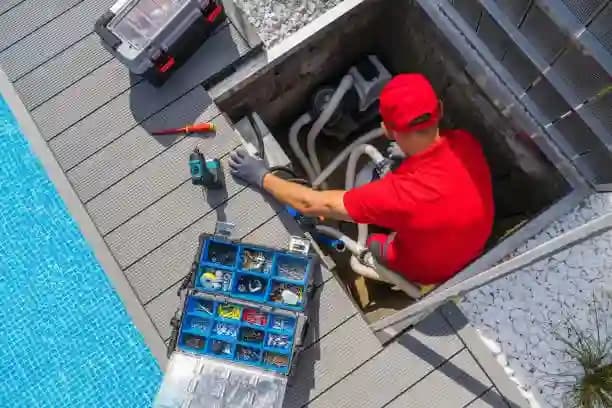
Pool Bonding Services
What is Pool Bonding
It is a process in electrical engineering where a conductive path is created to equalize potential differences between a swimming pool, spa, or hot tub and the surrounding earth.
The purpose of it is to reduce the risk of electrical shock and electrocution by providing a low-resistance path for electrical current to flow through in the event of a fault.
It is typically accomplished by connecting all metal parts of the pool or spa structure, electrical equipment, and metal pipes to a common bonding conductor, which is then connected to an earth ground.
Importance of Pool Bonding
It is essential because it helps ensure the safety of people using the pool or spa by reducing the risk of electrical shock and electrocution. Swimming pools and spas are often located near electrical equipment.
They can be wet environments, which increases the risk of electrical hazards. It provides a path for electrical current to flow to the ground in the event of a fault, reducing the voltage differential between the water and the surrounding environment and minimizing the risk of electrocution.
It is a requirement of most building codes and electrical safety regulations. A licensed electrician must perform it to ensure compliance and safety. Failure to properly bond a pool or spa can result in severe injury or death, so it is vital to take it seriously and ensure it is performed correctly.
Difference Between Grounding and Pool Bonding
In electrical engineering, grounding and bonding are related concepts with distinct functions.
Establishing a direct electrical connection between an electrical system and the earth is known as grounding. In the event of a fault, such as a short circuit, this connection provides a low-resistance path for electrical current to flow to the ground, thereby reducing the risk of electrical shock and electrocution.
Bonding, on the other hand, refers to connecting all metal components of a pool, spa, or hot tub to a common conductor (the bonding conductor) to equalize electrical potential and reduce the risk of electrical shock. The bonding conductor is then connected to the grounding conductor of the electrical system.
Bonding is essential because it reduces the risk of electrical shock by ensuring that all pool or spa structure metal components, electrical equipment, and metal pipes have the same electrical potential.
How Does Pool Bonding Work?
Pool bonding is a safety measure designed to shield swimmers from electrical shocks in the pool. It creates an electrical path between all metal objects in and around the area. When one metal object comes into contact with an electrical source, this conductive path created by pool bonding allows the current to travel safely downhill toward the ground instead of through people in the water.
The bonding system typically comprises a copper wire connected to all metal objects in and around the pool area, such as pumps, heaters, and railings. This wire then connects to a bonding lug to the pool's electrical systems and an installed grounding rod.
After connecting the pool's electrical system to its bonding system, any stray electrical currents that enter will be safely conducted away from swimmers using the bonding wire and grounding rod. It ensures that everyone in the water is safe against electrical shock hazards.
It is essential to distinguish pool bonding from pool grounding. Bonding creates a conductive path between metal objects, while grounding establishes direct contact with the earth. Both methods are essential safety measures that should be present in any pool area for added peace of mind.
Poor Pool Bonding Issues
Pool Bonding Installation Process
Identification of All Metal Objects in and Around the Pool Area:
The initial step in installing a pool requires identifying all metal objects around it that require bonding, such as pumps, heaters, railings, diving boards, or any other metal objects that come into contact with water.
Install the Bonding Wire:
Once all metal objects have been identified, you should install a copper wire to create a conductive path between them. This wire usually runs from the pool pump to the deck and around its perimeter, connecting to any metal objects along the way. Ensure that this wire runs continuously with no breaks in its circuit.
Connect the Bonding Wire to the Electrical System:
Once installed in the pool's electrical panel, the bonding wire is attached to a bonding lug, which is attached to the grounding rod near the pool.
Testing the Bonding System:
Once installed and connected to an electrical system, you should test it to guarantee it functions properly. It usually involves using a continuity tester to check for continuity between all metal objects in the pool area.
Document the installation:
It is essential to maintain documentation of the pool bonding installation, including all connections, wire type, size, and test results. This documentation can be invaluable in case the system needs inspection or repair.
Examples of Poor Pool Bonding Installation
-
Poor Installation: If its improperly installed, it may not provide adequate protection against electrical shock and electrocution.
-
Corrosion: The bonding conductor and connections can corrode over time, reducing the bonding system's effectiveness and increasing the risk of electrical shock.
-
Damage to bonding conductor: Construction work, landscaping, and other factors can cause damage to the bonding conductor, reducing the effectiveness of the bonding system.
-
Poor Connections: Suppose the connections between the metal components of the pool or spa and the bonding conductor are not secure and tight. In that case, the system may not function properly.
-
Poor Structuring: Changes to the pool or spa structure, such as adding new electrical equipment or a redesign, may necessitate a reevaluation and update of the bonding system.
-
Equipment deterioration: As electrical equipment used in a pool or spa ages and loses reliability, the risk of electrical hazards increases.
It is essential to have the bonding system periodically inspected by a licensed electrician to ensure its proper operation and address any potential problems. Failure to properly maintain the bonding system can result in severe injury or death. It is crucial to take it seriously and ensure it is installed and maintained correctly.
Contact us
Our company, Incan Electric, has provided Electrical Services in Southeastern Wisconsin for a couple of years. Our team of licensed and experienced electricians will help you with repairs, installation, maintenance, and upgrade of your electrical systems in your residential, commercial, and industrial properties. Feel free to contact us for your electrical service needs.



